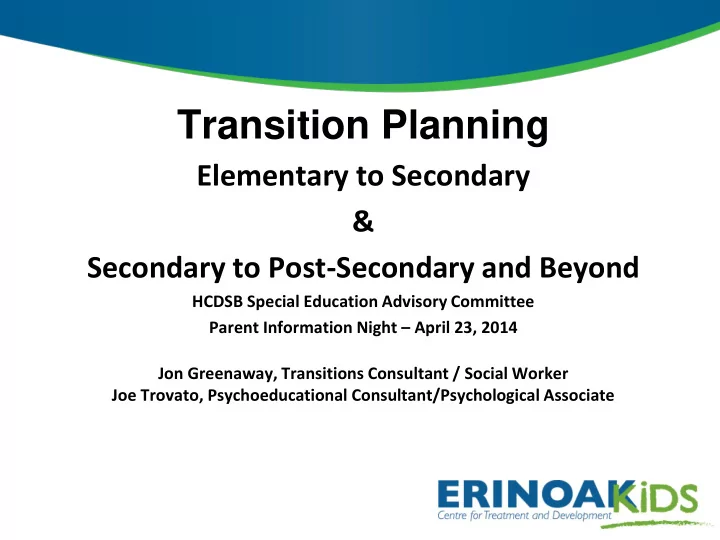

Transition Planning Elementary to Secondary & Secondary to Post-Secondary and Beyond HCDSB Special Education Advisory Committee Parent Information Night – April 23, 2014 Jon Greenaway, Transitions Consultant / Social Worker Joe Trovato, Psychoeducational Consultant/Psychological Associate
Why do we need to talk about and plan Transitions? • More and more children and youth with disabilities are surviving longer and longer due to advances in medicine and assistive technology • Opportunities need to be available for individuals with different abilities to actualize their true and full potential and develop their individualized pathways
Purpose of Workshop To provide a forum for discussion about the various pathways to fulfillment of full and true potential To provide specific knowledge about education’s contribution to the various pathways in helping prepare for the transition to post secondary education and/or life
Transition NAME AND TITLE OF PRESENTER
Definition of Transition? “Transition is defined as the purposeful, planned movement of youth with disabilities from child- centred to adult-oriented services offered by community agencies.” White, P.H. (1999). Transition to Adulthood. Current Opinion in Rheumatology, 11, 408-411
Individual Pathways in Education • Ontario Secondary School Certificate of Accomplishment • Ontario Secondary School Certificate • Ontario Secondary School Diploma
The IPRC Process • Identification • Placement • Review • Committee 7
The Individual Education Plan (IEP) • Outlines the specific special education programs and services required to actualize the true and full potential of students in their individualized pathways • Outlines the specific goals and processes related to meeting the goals • Outlines the assessment strategies for reviewing the student’s progress in the context of the identified goals
Other Individual Pathways • Developmental Services Ontario (DSO) • Ontario Disability Support Program (ODSP) 9
Developing a Transition Plan
The Keys to Successful Transitions • A shared future vision • Starting early • A comprehensive, structured plan for the future • Fostering skills for independence (Reiss J. & Gibson R., (2002). Health Care Transitions: Destination Unknown. Pediatrics , 110(6), 1307- 1314)
Questions you need to ask when developing a TRANSITION PLAN: 1. What stage are you at in the transition process? 2. What level of independence can be achieved cognitively, socially, and physically? 3. What are the goals regarding future independence? 4. What are the special skills and/or knowledge that are necessary for independence and positive health? (Gibson et al, Transitions Conference 2004)
Who should be Involved? • Individual • Parent/guardian • Educators/Counselors • Medical Professionals • Community Agencies/Organizations • Other
Developing a Vision? • Prerequisites for the pathway • Developing the skills needed
What are Life Skills? School/Career Community Self Relationships Home
Let’s talk about Life skills What are life skills? Life skills are… “learning how to cope with our day to day affairs” (Life skills coaches training manual – phase 1, 2000)
What life skills are required for the transition to adulthood? • Personal management skills • Health management skills • Community awareness • Recreation skills • Communication skills • Money skills • Advocacy skills • Time management skills • Household management skills • Social & interpersonal skills • Problem solving skills
How to Develop Skills When targeting skill development : • If you can teach the skill, teach it • If you can’t teach the skill, adapt it • If you can’t adapt it, figure out some way around it • If you can’t figure out some way around it, teach everyone else to deal with it • Peter Gerhardt
How can we support the development of life skills? • Allow dignity of risk • Provide safe environment where young people can experience and learn from natural consequences • Get creative! Think of ways to modify yet include young people in all activities • Encourage open communication • Encourage goal setting and personal commitment towards goals
Life Skills Programs Doing it on my own! (Moving On, Steps to Independence,The Independent Living Program)
LEARNING TO COOK Adapted kitchen utensils promote independence
LIFE CHANGING EXPERIENCES “If I can do this…I can do anything!” Alex, ILP participant 2006
COMMUNITY OUTINGS Learning about accessible housing options and accessible transportation encourages community integration
COMMUNITY SKILLS Learning to access community resources
Co-op Opportunity
Tips to prepare for Transition Determine what ongoing care will be needed • Medical/education/employment/day program Develop a Resource Binder • Description of disability, individual & agencies Linking to Community Service Providers • Visit and meet with future adult service provider • Develop a relationship with adult service provider Are there any ongoing equipment needs? • Equipment needs before age 18
Tips to prepare for Transition Participation in Life Skills Programs • If available, participate in independent living programs offered in your area • Community Living, Children’s Treatment Centre or at school Talk to other parents/families • Family support groups or mentorship programs Case Conference • Before graduation schedule a transition meeting with school, future community agencies and family Co-op opportunity • Developing skills for the future
Communication – Keys to Success • Be clear and concise • Regular communication with teachers and parents • Parents know their children and youth best • Make a list of what works best for youth • Listen to youth and give youth choices • Teach youth to advocate for themselves
Tools Available for Acquiring the Skills • Parents and youth with disabilities • School Heath Support Services (OT/PT/SLP) • Transition Planning Resource Guide: Ministry of Education 2002 • Special Education Resource Teacher (SERT) • Individual Education Plan (IEP) • Children’s Treatment Centre – WWW.OACRS.COM • Specific Disability Association • Peel &Halton Showcase Resource Fair / People in Motion
Contact Information ErinoakKids - Centre for Treatment and Development www.erinoakkids.ca Jon Greenway – Transitions Coordinator jgreenaway@erinoakkids.ca 905-855-2690 ext 2420 Joe Trovato – Psychoeducational Consultant jtrovato@erinoakkids.ca 905-855-2690 ext 4363
Recommend
More recommend